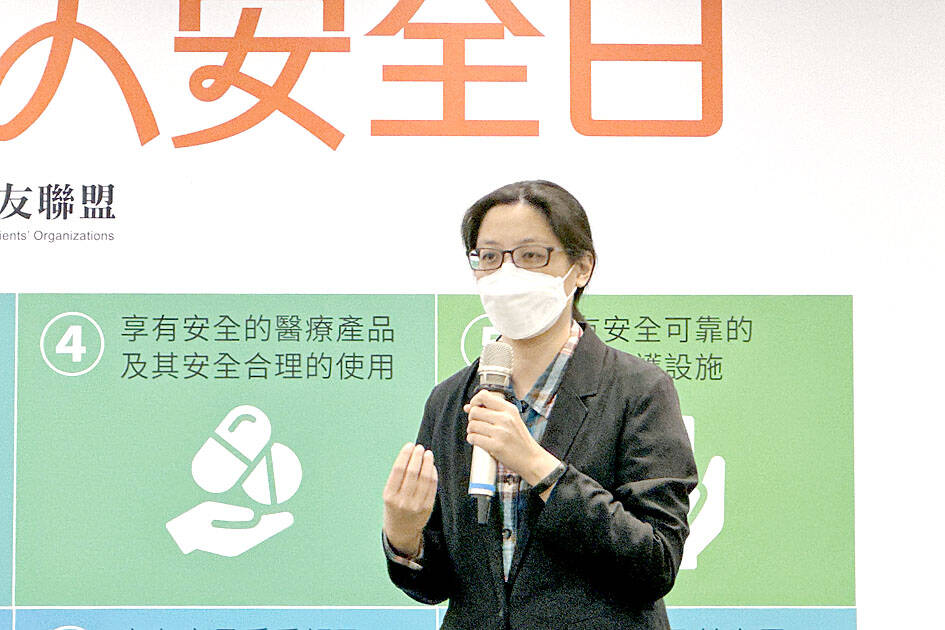The government’s Healthy Taiwan Promotion Committee should include representatives of patients, as they are the core of the healthcare system, the Taiwan Alliance of Patients’ Organizations (TAPO) said yesterday, as it called for “improving diagnosis for patient safety.”
Ahead of World Patient Safety Day — celebrated on Sep. 17 — TAPO chairperson Wu Hung-lai (吳鴻來) yesterday said the WHO launched its first ever Patient Safety Rights Charter this year, outlying the fundamental patient safety rights.
The theme for this year’s campaign is “improving diagnosis for patient safety,” raising attention about the importance of accurate and prompt diagnosis, he said, adding that one of the main objectives is to “empower patients and families to actively engage with health workers and healthcare leaders to improve diagnostic processes.”

Photo: Chiu Chih-jou, Taipei Times
Wu said that the WHO’s data showed “the magnitude of diagnostic errors is profound, accounting for nearly 16 percent of preventable harm across health systems,” and that “most adults are likely to face at least one diagnostic error in their lifetime.”
However, while patients are stakeholders in healthcare, their rights are often neglected, he said.
Asked by a reporter about not having representatives of patients in the committee last month, he said Taiwan is a democratic and open society and all stakeholders should participate in the making of policies.
President William Lai (賴清德) presided over the first meeting of the committee at the Presidential Office on Aug. 22. Following some experts’ suggestions that the committee should include representatives of nurses and pharmacists, Lai said they would be invited to future meetings.
Wu said healthcare cannot be discussed without the voices of patients, as every person becomes a patient at some point in their life.
“Having patients on site” is not real participation, he said, adding that they must be allowed to speak and engage in decisionmaking.
Many patients’ organizations have a lot of knowledge and thoughts on healthcare issues and they are able to communicate them, he said.
Taiwan Healthcare Reform Foundation secretary-general Lin Ya-hui (林雅惠) shared some cases of misdiagnosis that the foundation received petitions about over the years, including the removal of a healthy organ due to a cancer misdiagnosis, and delayed diagnoses of strokes or bone fractures.
Such problems might be caused by relatively short outpatient sessions and separation of departments, she said.
The government should expand the mechanisms of comprehensive medical care at hospitals and family physicians, she said.
The government should also help people improve their health literacy and encourage them to see a trusted family physician who knows their long-term health condition, she said.

Chinese Nationalist Party (KMT) Chairman Eric Chu (朱立倫), spokeswoman Yang Chih-yu (楊智伃) and Legislator Hsieh Lung-chieh (謝龍介) would be summoned by police for questioning for leading an illegal assembly on Thursday evening last week, Minister of the Interior Liu Shyh-fang (劉世芳) said today. The three KMT officials led an assembly outside the Taipei City Prosecutors’ Office, a restricted area where public assembly is not allowed, protesting the questioning of several KMT staff and searches of KMT headquarters and offices in a recall petition forgery case. Chu, Yang and Hsieh are all suspected of contravening the Assembly and Parade Act (集會遊行法) by holding

PRAISE: Japanese visitor Takashi Kubota said the Taiwanese temple architecture images showcased in the AI Art Gallery were the most impressive displays he saw Taiwan does not have an official pavilion at the World Expo in Osaka, Japan, because of its diplomatic predicament, but the government-backed Tech World pavilion is drawing interest with its unique recreations of works by Taiwanese artists. The pavilion features an artificial intelligence (AI)-based art gallery showcasing works of famous Taiwanese artists from the Japanese colonial period using innovative technologies. Among its main simulated displays are Eastern gouache paintings by Chen Chin (陳進), Lin Yu-shan (林玉山) and Kuo Hsueh-hu (郭雪湖), who were the three young Taiwanese painters selected for the East Asian Painting exhibition in 1927. Gouache is a water-based

Taiwan would welcome the return of Honduras as a diplomatic ally if its next president decides to make such a move, Minister of Foreign Affairs Lin Chia-lung (林佳龍) said yesterday. “Of course, we would welcome Honduras if they want to restore diplomatic ties with Taiwan after their elections,” Lin said at a meeting of the legislature’s Foreign Affairs and National Defense Committee, when asked to comment on statements made by two of the three Honduran presidential candidates during the presidential campaign in the Central American country. Taiwan is paying close attention to the region as a whole in the wake of a

OFF-TARGET: More than 30,000 participants were expected to take part in the Games next month, but only 6,550 foreign and 19,400 Taiwanese athletes have registered Taipei city councilors yesterday blasted the organizers of next month’s World Masters Games over sudden timetable and venue changes, which they said have caused thousands of participants to back out of the international sporting event, among other organizational issues. They also cited visa delays and political interference by China as reasons many foreign athletes are requesting refunds for the event, to be held from May 17 to 30. Jointly organized by the Taipei and New Taipei City governments, the games have been rocked by numerous controversies since preparations began in 2020. Taipei City Councilor Lin Yen-feng (林延鳳) said yesterday that new measures by